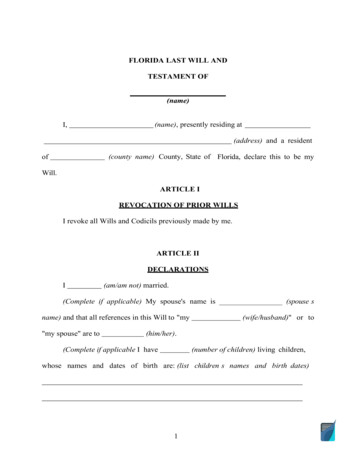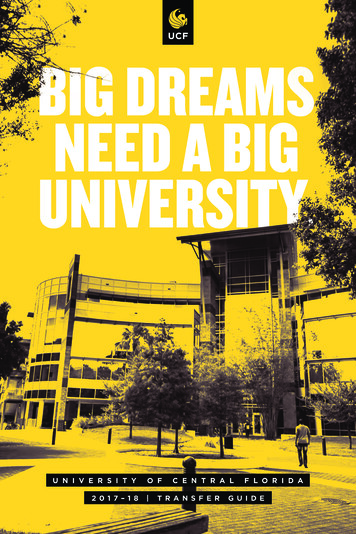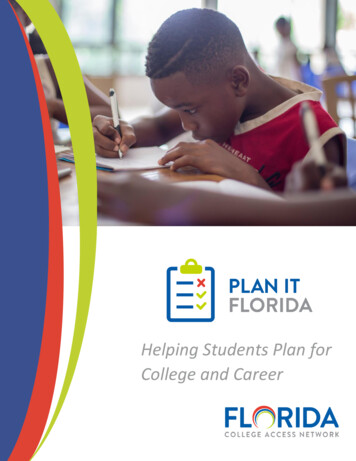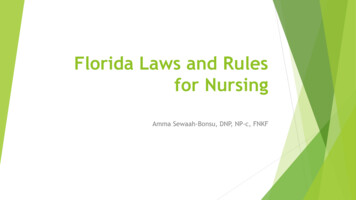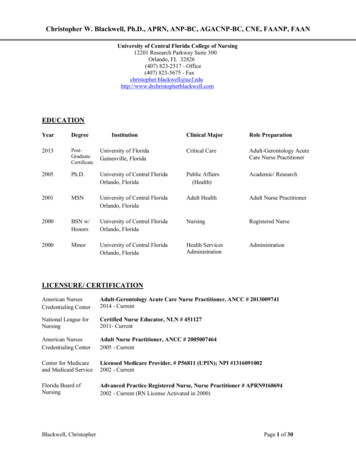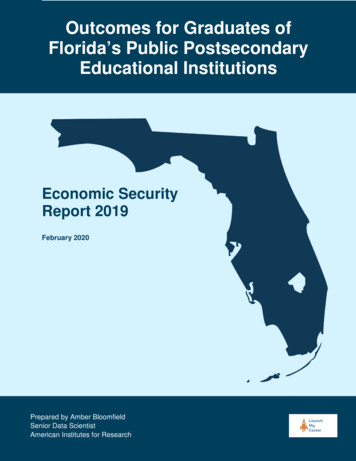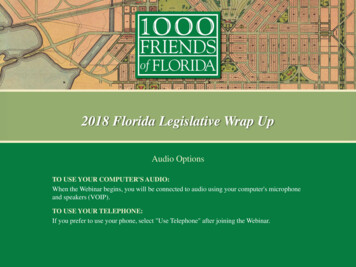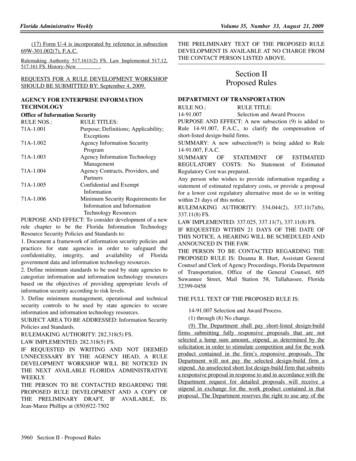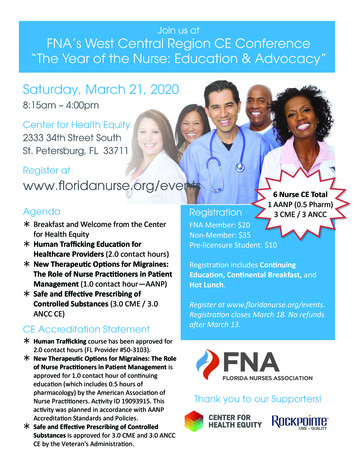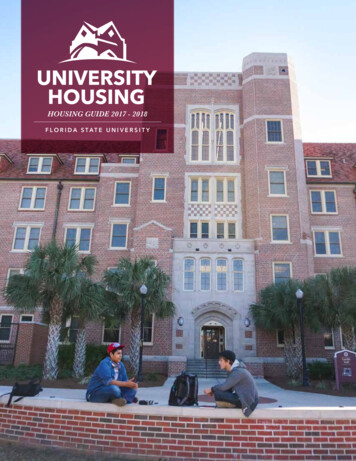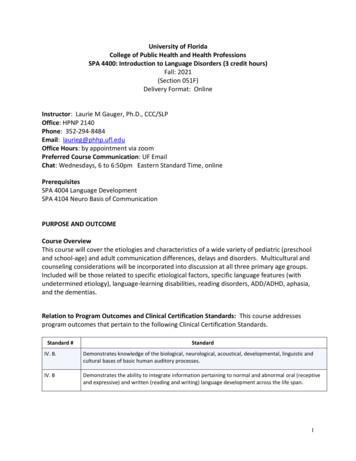
Transcription
University of FloridaCollege of Public Health and Health ProfessionsSPA 4400: Introduction to Language Disorders (3 credit hours)Fall: 2021(Section 051F)Delivery Format: OnlineInstructor: Laurie M Gauger, Ph.D., CCC/SLPOffice: HPNP 2140Phone: 352-294-8484Email: laurieg@phhp.ufl.eduOffice Hours: by appointment via zoomPreferred Course Communication: UF EmailChat: Wednesdays, 6 to 6:50pm Eastern Standard Time, onlinePrerequisitesSPA 4004 Language DevelopmentSPA 4104 Neuro Basis of CommunicationPURPOSE AND OUTCOMECourse OverviewThis course will cover the etiologies and characteristics of a wide variety of pediatric (preschooland school-age) and adult communication differences, delays and disorders. Multicultural andcounseling considerations will be incorporated into discussion at all three primary age groups.Included will be those related to specific etiological factors, specific language features (withundetermined etiology), language-learning disabilities, reading disorders, ADD/ADHD, aphasia,and the dementias.Relation to Program Outcomes and Clinical Certification Standards: This course addressesprogram outcomes that pertain to the following Clinical Certification Standards.Standard #StandardIV. B.Demonstrates knowledge of the biological, neurological, acoustical, developmental, linguistic andcultural bases of basic human auditory processes.IV. BDemonstrates the ability to integrate information pertaining to normal and abnormal oral (receptiveand expressive) and written (reading and writing) language development across the life span.1
IV. CDemonstrates knowledge of the etiologies, characteristics, and anatomical/physiological, acoustic,psychological, developmental, and linguistic and cultural correlates of oral (receptive and expressive)and written (reading and writing) language disorders and social aspects of communication disorders.IV. DDemonstrates current knowledge of the principles and methods of prevention, assessment, andintervention for people with oral (receptive and expressive) language disorders, written (reading andwriting) language disorders and social aspects of communication disorders.Course Objectives and/or GoalsKnowledge Objectives:You will: Know the normal processes of oral and written language development and the socialaspects of communication Know the etiologies of various oral and written language disorders Know the characteristics of various oral and written language disorders Know how to prevent oral and written language disorders Know the basic approaches to and purposes of assess oral and written languagedisorders Know the basic techniques and procedures to facilitate oral and written languagelearningSkill Objectives:You will be able to: Explain normal aspects of oral and written language development Explain causes of oral and written language disorders Describe neurological, psychological, developmental and cultural correlates of oral andwritten language disorders Describe various methods to prevent oral and written language disorders Describe the assessment of oral and written language disorders, including assessmentprotocols and interpreting data Describe the treatment for oral and written language disorders, including writing goalsand treatment methodsInstruction Methods This is an online class. All of the lectures have been recorded and are available online.There is a class chat each week that is recorded for those who cannot attend the chat.The purpose of the chat is to review lecture material, discuss students’ questions,provide clarification of complex concepts and discuss assigned readings. It is not meantto replace recorded lectures.2
I expect that you will have viewed all of the recorded lectures and videos and completedthe readings assigned for a particular week before the chat, so that you can fullyparticipate in the chat.Biweekly quizzes will be available from immediately after the chats (i.e., starting at 8pmWednesday) until 11:59 pm on the following Sunday.You can do the quizzes at any time during that time period; however, you cannot“preview” a quiz – once you open the quiz, the timer starts.DESCRIPTION OF COURSE CONTENTTopical Outline/Course ScheduleWeek/DateWeek 18/23-8/29Week 28/30-9/5Week 39/7-9/12Week 49/13-9/19TopicIntroductionsSyllabus ReviewOverview oflanguage andhumancommunicationDefinitionsReview ofNormal LanguageDevelopmentApproaches andpurposes ofassessmentConsiderationsfor /VideosLecture 1The Unique Speech Needs of Children in Poverty. ASHALeader, March 2017, Vol 22, 30-31.The Linguistic Genius of Babieshttps://youtu.be/G2XBIkHW954Lecture 2Milestone GuideWhy Talking to Kids Mattershttps://youtu.be/IpHwJyjm7rMQuiz 1 – Due: 9/5 by 11:59pm (before midnight) –Lectures 1, 2 and chatsLecture 13Do First 1000 Words Determine the Rest of Your Life?https://youtu.be/XCscN4zuvd4Lecture 14Cohen, et al. (2005). Effects of computer-basedintervention through acoustically-modified speech Improving Early Child Development with Wordshttps://youtu.be/y8qc8Aa3weE3
Quiz 2 – Due: 9/19 by 11:59pm – Lectures 13 and 14and chatsWeek 59/20-9/26Week 69/27-10/3Toddler pairmentLanguage Sample Analysis – Due 09/19 by 11:59Lecture 3When is Simplified – Too Simple? ASHA Leader, January2017, 42-47.Lecture 48-yr old with mixed expressive language disorderhttps://youtu.be/UmLu8rzbHhEADHD child vs. non-ADHD child interviewhttps://youtu.be/-IO6zqIm88sHow to (explain) ADHDhttps://youtu.be/jhcn1 qsYmgSocial Communication Disorder: This is Our Baby, SLPs!ASHA Leader, April 2018, 38-39.Week 710/4-10/10Week 810/11-10/17Week 910/18-10/24Adolescents withlanguageimpairmentMidterm ExamLanguage inindividuals withIntellectualDisabilityIntervention Assignment – Due 10/3 by 11:59Lecture 5Quiz 3 – Due: 10/10 by 11:59pm – Lectures 3, 4 and 5and chatsMidterm – Due: 10/17 by 11:59pm – Lectures 1-5 and13-14 and chatsLecture 6The effectiveness of Responsive Teaching with Childrenwith Down SyndromeHow much do you know about intellectual disabilities?Tedx Vancouverhttps://youtu.be/BURbLmQL1BEWeek 1010/25-10/31Language inAutism SpectrumDisorderLecture 7Invisible Girls. ASHA Leader, April 2018, 48-55.4
Autism – what we know (and what we don’t know yet).Ted2014 Wendy Chunghttps://www.ted.com/talks/wendy chung autism whatwe know and what we don t know yet?utm campaign tedspread&utm medium referral&utm source tedcomshareEarly Signs of Autismwww.youtube.com/watch?v YtvP5A5OHpU&feature youtubeWeek 1111/1 – 11/7Language ofchildren withhearingimpairmentLecture 8The Challenge with Processing Language (Dr. Nittrouer,TedX Talk)https://youtu.be/lF7IKv6sYxgHow does it sound for people with hearing losshttps://youtu.be/hQbuqcRVNg4Lost in the Midst. ASHA Leader, July 2017, Vol. 22, 48-55Children who are Hard of Hearing. ASHA Leader, June2017, Vol. 22, 16-17Week 1211/8-11/14Written languagedisordersQuiz 4 – Due: 11/7 by 11:59pm – Lectures 6, 7, 8 andchatsPowerPoints and ReadingsDyslexia and the Brainhttps://youtu.be/QrF6m1mRsCQDyslexia: A Hidden Disabilityhttps://youtu.be/8m1fCz3ohMwWhat is Dyslexia?https://youtu.be/zafiGBrFkRMWeek 1311/15-11/21Language andLinguistically-Evidence-Based Practice Presentation Due 11/14 by11:59pmLecture 95
and culturallydiverse childrenBilingualism and Speech-Language Pathologyhttps://youtu.be/KxnN6Ig4bqcBilingual Language Developmenthttps://youtu.be/SNRqJo9niFYWeek 1411/22-11/23ThanksgivingAcquiredlanguagedisorders inchildren (TBI andaphasia)Lecture 10Supporting “Return to Learn” after TBI. ASHA Leader,June 2018, 36-37.Keep Moving Forward: Children with Brain Injury:https://youtu.be/wUZWRhH4aaITeens and Loss: Josh, TBI: https://youtu.be/bnpaQ6b7XUWeek 1511/29-12/5Aphasia andDementiaPowerPoints and VideosAphasia videos:https://youtu.be/w95EF3fW2lA - Anomic aphasiahttps://youtu.be/IP8hkopObvs - Broca’s aphasiahttps://youtu.be/3oef68YabD0 - Wernicke’s aphasiaExperience 12 Minutes in Alzheimer’s Dementiahttps://youtu.be/LL Gq7Shc-YHelping Them Hold On. ASHA Leader. Oct 2016, Vol. 21,44-51Quiz 5 – Due: 12/5 by 11:59pm – written languagedisorders, Lectures 9, 10 and chatsWeek 1612/6-12/8Final ExamBilingual Paper - Due: 12/8 by 11:59pmFinal - Due: 12/16 by 11:59pm – Lectures 7-10, writtenlanguage disorders, aphasia and dementiaScheduling a One-on-One AppointmentIn addition to emailing me, you can schedule a one-on-one appointment with me for questionsthat you do not feel comfortable posting or for any other questions/concerns you may have.This is not to be used as a way to make up a missed class. To set up an appointment, pleaseemail me.6
Course Materials and TechnologyRequired:Membership with Master Clinician Network (www.masterclinician.org). This membership costs 45/yr. Please list me as your supervisor so that I can sign off on your observations. The hoursyou earn through these observations can be used towards the 25 observation hours that ASHArequires in graduate school.Optional Book:Reed, V. (2018). An Introduction to Children with Language DisordersLinks to help you access scholarly articles for free. Google Scholar Using the UF library The librarian for our major is Nancy Schaefer nancys@ufl.edu or 352-273-8417For technical support for this class, please contact the UF Help Desk at: helpdesk@ufl.edu(352) 392-HELP - select option 2https://helpdesk.ufl.edu/Additional Academic ResourcesCareer Connections Center: Reitz Union Suite 1300, 352-392-1601. Careerassistance and counseling services.Library Support: Various ways to receive assistance with respect to using the librariesor finding resources.Teaching Center: Broward Hall, 352-392-2010 or to make an appointment352- 392-6420. General study skills and tutoring.Writing Studio: 2215 Turlington Hall, 352-846-1138. Help brainstorming,formatting, and writing papers.Student Complaints On-Campus: Visit the Student Honor Code and StudentConduct Code webpage for more information.On-Line Students Complaints: View the Distance Learning Student ComplaintProcess.7
ACADEMIC REQUIREMENTS AND GRADINGAssignments1. Quizzes: Five quizzes will be given, each worth 15 points. The format of the quizzes willinclude multiple choice, true-false and fill-in-the-blank questions and will cover assignedreadings, lecture material (PowerPoints and lectures) and chat discussions. Quiz datesare listed in the course calendar. Quizzes will become available immediately after Chatsand close on midnight on the following Sunday (see dates below and in calendar). Totalpossible 75 points.2. Tests: Two tests (midterm and final) will be given, each worth 100 points. The formatof the tests will be mixed (multiple-choice, true/false, fill-in-the-blank and short answer)and will cover assigned readings, lecture material (PowerPoints and lectures), and chatdiscussions. The midterm will include all covered material up to that point. The finalwill include all material covered after the midterm. Test dates are listed in the coursecalendar. The midterm and final will be available as stated in the semester agenda andare taken on-line the same way the quizzes are taken.3. Language Sample Analysis: A 50-utterance language sample will be provided to you.You are to complete analyses for: mean length of utterance and Brown’s Stages ofLanguage Development; order of acquisition of Brown’s 14 grammatical morphemes;number of different words; pragmatics; and speech intelligibility. You will be given anexample template to follow when writing up your analysis. You will include thefollowing information: Is the child’s MLU consistent with his age? What stage is thechild’s MLU? Is the child using the morphemes that are expected for his/her age? Is thechild’s semantic diversity (NDW) appropriate for his/her age? Does the childdemonstrate age-appropriate pragmatics? Is the child’s speech intelligibilityappropriate for his/her age? Give examples to support your interpretation. Paper isworth 100 points.4. Bilingual/non-standard dialect Paper: Interview an adult who considers herself orhimself to be bilingual or a speaker of another dialect. Ask the person questionsregarding the age at which each language/ dialect was learned, how eachlanguage/dialect was learned (i.e., from parents, television, school), strengths andweaknesses in each language/dialect, feelings toward each language/dialect, how andwith whom each language/dialect is currently used, and whether the bilingual individualwould like to bring up his or her (future) children bilingually/bidialectally/non-standarddialect speaker. Write a two-page paper on your findings. Paper is worth 30 points.5. Intervention Assignment: Describe two intervention activities that you could do with a3-year-old child who is only using one-word utterances. One activity should utilize selftalk or parallel talk and the other activity should be used to modify or encourage thedesired target (extensions, expansions, recasts). Describe your activity including thetarget, materials, dialogue between you and child. Refer to your lecture notes andhandouts for examples. Assignment is worth 50 points.8
6. Evidence-based Practice Presentation: In small groups, you will select an article from apeer-reviewed journal that reviews findings from a study comparing differentintervention approaches for a particular language disorder. Prepare a powerpoint ofyour article. Evaluate the study using evidence-based practice guidelines. Includeinformation on how you would use this information in developing an intervention plan.I will divide you into small groups, however if you know someone that you would like tohave in your group, please let me know. You can either present your presentation tome live over Zoom or submit your powerpoint presentation to me with voice overs onyour slides. I expect each group member to participate in the presentation. Moreinformation about this assignment will be discussed in class. Presentation is worth 75points.7. Discussion Board Participation: Students are expected to respond to posted questionsand provide a follow-up response of a classmate’s comment/question on the DiscussionBoard during the semester. In order to get credit for your post, you must complete yourposts by midnight Sunday of the week it is posted. Discussion questions will be postedMonday morning and responses are due by the following Sunday evening. Many of thediscussion questions will refer to assigned videos from Master Clinician. Five pointsmay be earned each week. No partial credit will be given. Postings may includequestions, introduce an interesting discussion for the group or make a substantivecomment about someone else’s point. Questions and comments must be related tocourse lectures. You are expected to post each week except the week of the midtermfor a total of 14 weeks. Total possible 70 points.GradingRequirementDue datePoints or % of final gradeClinical Standard(s) BeingAssessedQuiz 19/05/2115 pointsIV. BLanguage Sample Analysis9/19/21100 pointsIV. B, IV. C, IV. DQuiz 29/19/2115 pointsIV. B, IV. DIntervention Assignment10/03/2150 pointsIV. B, IV. C, IV. DQuiz 310/10/2115 pointsIV. B, IV. C, IV. DMidterm10/17/21100 pointsIV.B, IV. C, IV.DEvidence-Based PracticePresentation11/14/2175 pointsIV. B, IV. C, IV. DQuiz 411/7/2115 pointsIV. B, IV. C, IV. DQuiz 512/5/2115 pointsIV. B, IV. C, IV. DPaper onBilingualism/dialects12/08/2130 pointsIV. B, IV. C, IV. D9
Final Exam12/16/21100 pointsIV. B, IV. C, IV. DDiscussion12/05/2170 pointsIV. B, IV. C, IV. D QuizzesExamsLanguage SampleBilingual/dialectDiscussion PostsEBP PresentationTherapy Assign52111411@ 15 points@ 100 points@ 100 points@ 30 points@ 5 points@ 75 points@ 50 pointsTotal: 75 pointsTotal: 200 pointsTotal: 100 pointsTotal: 30 pointsTotal: 70 pointsTotal: 75 pointsTotal: 50 pointsTotal: 600 pointsCourse grades will be assigned as follows:% ofpts9310090928789# of pts558600A540557A-522- 498539 521B BLettergrade838680–8277797076480497B-462- 402479 461C C676963666062Below60378401D 360377D300314D-Below360EPlease be aware that grades lower than a C are not acceptable grades for core classes. Inaddition, the Bachelor of Health Science does not use C- grades.Letter AA- B B B- C C C- D DD- EWF ING S-UGrade0.0Grade 4.0 3.67 3.33 3.0 2.67 2.33 2.0 1.67 1.33 1.0 0.67 0.0 0.0 0.0 0.0PointsFor greater detail on the meaning of letter grades and university policies related to them, seethe Registrar’s Grade Policy regulations/info/grades.aspxEXAM POLICYPolicy Related to Make up Exams or Other Work1. All faculty are bound by the UF policy for excused absences. For information regardingthe UF Attendance Policy see the Registrar website for additional ations/info/attendance.aspx.10
You should schedule your own quiz and exam times within a 52-hourwindow, so there should be little need for make-up quizzes or exams. If you know that you will have a scheduling conflict for an exam orquiz, you have the option of scheduling it sooner. Contact theinstructor directly.a. Absences: If you must miss a chat, quiz or examination due to illness oremergency, you should contact the professor beforehand. Unexcusedabsences for quizzes and examinations will be graded as a “0.” Quizzes thatare submitted late will be lowered by one letter grade.b. Participation in ongoing class discussions is expected and will be tracked.2. Any requests for make-ups due to technical issues MUST be accompanied by the ticketnumber received from LSS when the problem was reported to them. The ticket numberwill document the time and date of the problem. You MUST e-mail me within 24 hoursof the technical difficulty if you wish to request a make-up.STUDENT EXPECTATIONS, ROLES, AND OPPORTUNITIES FOR INPUTExpectations Regarding Course BehaviorYou are expected to attend each class chat and participate. Your questions, comments, andobservations make the class lively and interesting and are an intrinsic aspect of professionalism.Online Courtesy and Respect. The rules of “Netiquette” should be followed at all times. The Golden Rule: Treat others the way you want to be treated online.Other rules: unication GuidelinesPlease contact the instructor directly with any questions or concerns that you have. Use theinstructor’s UF email (laurieg@phhp.ufl.edu) not Canvas for all correspondence.Academic IntegrityStudents are expected to act in accordance with the University of Florida policy on academicintegrity. As a student at the University of Florida, you have committed yourself to uphold theHonor Code, which includes the following pledge:“We, the members of the University of Florida community, pledge to hold ourselves and ourpeers to the highest standards of honesty and integrity.”You are expected to exhibit behavior consistent with this commitment to the UF academiccommunity, and on all work submitted for credit at the University of Florida, the followingpledge is either required or implied:11
“On my honor, I have neither given nor received unauthorized aid in doing this assignment.”It is your individual responsibility to know and comply with all university policies andprocedures regarding academic integrity and the Student Honor Code. Violations of the HonorCode at the University of Florida will not be tolerated. Violations will be reported to the Deanof Students Office for consideration of disciplinary action. For additional information regardingAcademic Integrity, please see Student Conduct and Honor Code or the Graduate StudentWebsite for additional udents/introduction.htmlPlease remember cheating, lying, misrepresentation, or plagiarism in any form is unacceptableand inexcusable behavior.Professionalism and COVIDAs students pursuing a path in the health professions or public health, it is crucial todemonstrate professional behaviors that reflect integrity and commitment to the health ofpatients, fellow health professionals, and to populations we serve. To accomplish this, a strongresponsibility for the well-being of others must be evident in our decisions, along withaccountability for our actions. Professionalism in the health disciplines requires adherence tohigh standards of conduct that begin long before graduation. This is particularly true duringtimes of health emergencies such as the COVID pandemic, given our professional habits canhave a direct impact upon the health of persons entrusted to us.If you are not vaccinated, get vaccinated. Vaccines are readily available at no cost and havebeen demonstrated to be safe and effective against the COVID-19 virus. Visit this link for detailson where to get your shot, including options that do not require an nations/vaccine-availability/. Students who receive thefirst dose of the vaccine somewhere off-campus and/or outside of Gainesville can still receivetheir second dose on campus.In response to COVID-19, the following professional practices are in place to maintain yourlearning environment, to enhance the safety of our in-classroom interactions, and to protectthe health and safety of ourselves, our patients, our neighbors, and our loved ones. You are required to wear approved face coverings at all times while in Health ScienceCenter classrooms and within Health Science Center buildings even if you arevaccinated.If you are sick, stay home and self-quarantine. Please visit the UF Health Screen, Test &Protect website about next steps, retake the questionnaire and schedule your test forno sooner than 24 hours after your symptoms began. Please call your primary careprovider if you are ill and need immediate care or the UF Student Health Care Center at352-392-1161 (or email covid@shcc.ufl.edu) to be evaluated for testing and to receivefurther instructions about returning to campus. UF Health Screen, Test & Protect offers12
guidance when you are sick, have been exposed to someone who has tested positive orhave tested positive yourself. Visit the UF Health Screen, Test & Protect website formore information.Continue to follow healthy habits, including best practices like frequent hand washing.Avoid crowded places (including gatherings/parties with more than 10 people)Sanitizing supplies are available in the classroom if you wish to wipe down your desks prior tositting down and at the end of the class. Hand sanitizing stations will be located in everyclassroom.Course materials will be provided to you with an excused absence, and you will be given areasonable amount of time to make up work. If you are withheld from campus by theDepartment of Health through Screen, Test & Protect you are not permitted to use any oncampus facilities. Students attempting to attend campus activities when withheld from campuswill be referred to the Dean of Students Office.Continue to regularly visit coronavirus.UFHealth.org and coronavirus.ufl.edu for up-to-dateinformation about COVID-19 and vaccination.COVID-19 SymptomsSee -testing/symptoms.html forinformation about COVID-19 symptoms, which may include fever, cough, shortness of breath ordifficulty breathing, fatigue, chills, muscle or body aches, headache, sore throat, congestion orrunny nose, nausea or vomiting, diarrhea, and loss of taste or smell.Recording Within the Course:Students are allowed to record video or audio of class lectures. However, the purposes forwhich these recordings may be used are strictly controlled. The only allowable purposes are (1)for personal educational use, (2) in connection with a complaint to the university, or (3) asevidence in, or in preparation for, a criminal or civil proceeding. All other purposes areprohibited. Specifically, students may not publish recorded lectures without the writtenconsent of the instructor.A “class lecture” is an educational presentation intended to inform or teach enrolled studentsabout a particular subject, including any instructor-led discussions that form part of thepresentation, and delivered by any instructor hired or appointed by the University, or by aguest instructor, as part of a University of Florida course. A class lecture does not include labsessions, student presentations, clinical presentations such as patient history, academicexercises involving solely student participation, assessments (quizzes, tests, exams), field trips,private conversations between students in the class or between a student and the faculty orlecturer during a class session.13
Publication without permission of the instructor is prohibited. To “publish” means to share,transmit, circulate, distribute, or provide access to a recording, regardless of format or medium,to another person (or persons), including but not limited to another student within the sameclass section. Additionally, a recording, or transcript of a recording, is considered published if itis posted on or uploaded to, in whole or in part, any media platform, including but not limitedto social media, book, magazine, newspaper, leaflet, or third party note/tutoring services. Astudent who publishes a recording without written consent may be subject to a civil cause ofaction instituted by a person injured by the publication and/or discipline under UF Regulation4.040 Student Honor Code and Student Conduct Code.Policies Related to Guests Attending Class:Only registered students are permitted to attend class. However, we recognize that studentswho are caretakers may face occasional unexpected challenges creating attendancebarriers. Therefore, by exception, a department chair or his or her designee (e.g., instructors)may grant a student permission to bring a guest(s) for a total of two class sessions persemester. This is two sessions total across all courses. No further extensions will begranted. Please note that guests are not permitted to attend either cadaver or wetlabs. Students are responsible for course material regardless of attendance. For additionalinformation, please review the Classroom Guests of Students policy in its entirety. Link to fullpolicy: e/getstarted.htmOnline Faculty Course Evaluation ProcessStudents are expected to provide feedback on the quality of instruction in this course bycompleting online evaluations at https://evaluations.ufl.edu. Evaluations are typically openduring the last two or three weeks of the semester, but students will be given specific timeswhen they are open. Summary results of these assessments are available to students athttps://evaluations.ufl.edu/results/.SUPPORT SERVICESAccommodations for Students with DisabilitiesIf you require classroom accommodation because of a disability, you must register with theDean of Students Office http://www.dso.ufl.edu within the first week of class. The Dean ofStudents Office will provide documentation of accommodations to you, which you then give tome as the instructor of the course to receive accommodations. Please make sure you providethis letter to me by the end of the second week of the course. The College is committed toproviding reasonable accommodations to assist students in their coursework.Counseling and Student HealthStudents sometimes experience stress from academic expectations and/or personal andinterpersonal issues that may interfere with their academic performance. If you find yourself14
facing issues that have the potential to or are already negatively affecting your coursework, youare encouraged to talk with an instructor and/or seek help through University resourcesavailable to you. The Counseling and Wellness Center 352-392-1575 offers a variety of support servicessuch as psychological assessment and intervention and assistance for math and testanxiety. Visit their web site for more information: http://www.counseling.ufl.edu. Online and in person assistance is available. You Matter We Care website: http://www.umatter.ufl.edu/. If you are feelingoverwhelmed or stressed, you can reach out for help through the You Matter We Carewebsite, which is staffed by Dean of Students and Counseling Center personnel. The Student Health Care Center at Shands is a satellite clinic of the main Student HealthCare Center located on Fletcher Drive on campus. Student Health at Shands offers avariety of clinical services. The clinic is located on the second floor of the Dental Towerin the Health Science Center. For more information, contact the clinic at 392-0627 orcheck out the web site at: https://shcc.ufl.edu/ Crisis intervention is always available 24/7 from:Alachua County Crisis Center(352) ISCENTER/Pages/CrisisCenter.aspxDo not wait until you reach a crisis to come in and talk with us. We have helped many studentsthrough stressful situations impacting their academic performance. You are not alone so do notbe afraid to ask for assistance.Inclusive Learning EnvironmentPublic Health and health professions are based on the belief in human dignity and on respectfor the individual. As we share our personal beliefs inside or outside the classroom, it is alwayswith the understanding that we value and respect diversity of background, experience, andopinion, where every individual feels valued. We believe in, and promote, openness andtolerance of differences in ethnicity and culture, and we respect differing personal, spiritual,religious and political views. We further believe that celebrating such diversity enriches thequality of the educational experiences we provide our students and enhances our own personaland professional relationships. We embrace The University of Florida’s Non-DiscriminationPolicy, which reads, “The University shall actively promote equal opportunity policies andpracti
Teaching Center: Broward Hall, 352-392-2010 or to make an appointment 352- 392-6420. General study skills and tutoring. Writing Studio: 2215 Turlington Hall, 352-846-1138. Help brainstorming, formatting, and writing papers. Student Complaints On-Campus: Visit the Student Honor Code and Student Conduct Code webpage for more information.
